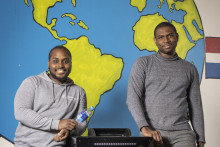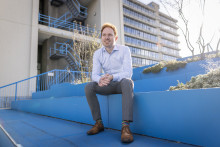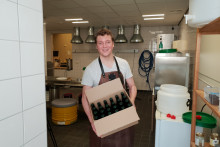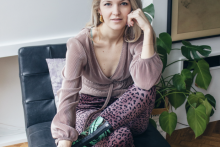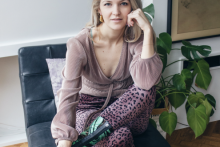Throw your trash in and the bin will do the rest. Garby the Garbage Bin, as the young graduates call their waste sorting device, identifies the object and places it into the correct compartment. Recycling made easy. Or as, the company’s CEO Tyrell Pantophlet puts it: ‘It’s not complex, it’s PLAEX.’
The two founders came together in 2020 thanks to their joint passion for sustainability. ‘We want to promote sustainable transition,’ says Pantophlet, graduate of Advanced Technology. ‘I’m really bothered by incorrect recycling. I was born in Saint Maarten, where we have a lot of problems with sustainability. There are landfills that are constantly burning, which I really hated. I want to contribute to a future where all waste is properly recycled. I want to create a better tomorrow, so that my kids don’t have to suffer.’
‘Recycling is a fascinating world,’ adds Victor Okoro, PLAEX’s CSO who studied Psychology at the UT. ‘The more we look into it, the more we see that only a couple of changes can have drastic consequences. What we are doing can have an immense social and environmental impact. Would I choose to co-found another company? Probably not. This is a great thing we are working on.’
Obstacles and accolades
Garby indeed seems to be working. It recognizes the ‘trash’, which it then moves into one of the four compartments based on the Dutch waste stream – organic, plastic, paper and residual. All within a few seconds. The functional prototype has brought PLAEX a fair share of success, including an array of prizes such as the Prototyping Award at UT Challenge 2020, CSU Innovation Award 2020 and making it to the Top 5 Ideas at Philips Innovation Awards 2022.
Unfortunately, we’ve learnt that the waste management market is not set up in our favour.
However, despite these accolades and successfully completed pilot studies within companies, the start-up has had difficulties with bringing Garby to the market. ‘This was partly due to personal circumstances,’ explains Tyrell Pantophlet. ‘I was diagnosed with cancer last year and was in treatment for nine months. I’m doing much better now, but this naturally slowed things down.’
This wasn’t the only obstacle, though. From the beginning, the start-up aimed to provide services mainly to companies and businesses, as they produce more waste than households. ‘Unfortunately, we’ve learnt that the waste management market is not set up in our favour,’ says Okoro. ‘At the moment, it is cheaper for companies to only recycle paper and put everything else into residual waste. The financial incentive to get a fully recycled stream was therefore too low and our invention was not useful for the market.’
As of 2023, this could all change. Thanks to new national rules, it will be more attractive for companies in the Netherlands to separate plastic, metal cans, drink cartons and glass waste. ‘This should provide a lot more welcoming landscape for our solution,’ adds Okoro. ‘However, convincing clients that waste separation is a problem that they need to solve is also a challenge. Some organizations just want to involve people and teach them how to separate, but that is not easy. You may indeed ask: why not just throw everything in one bin and separate afterwards? That is not ideal because of cross contamination. The materials come in contact and pollute each other, making it impossible to recycle them. Why not educate people? Even the most educated person will make mistakes and that will inevitably lead to cross contamination. At that point cleaning and recycling of the materials becomes too expensive for companies and the waste gets burned or landfilled.’
‘Keep going’
Even though, the journey has been far from easy, the alumni duo is most certainly not ready to quit. ‘It has been challenging, but our enthusiasm hasn’t faded away,’ says the CSO. ‘We are exploring different ways to get to the market. We are hoping to acquire a launching customer and raise more funding. We have secured several good collaborations, such as with Oost NL, and we are close to starting a pilot with a large customer. We are ready to move from a prototyping phase to the revenue phase and actually make a change.’
‘We have heard a fair amount of ‘no’ in this process,’ says Pantophlet. ‘But as I heard in a TED talk recently: when you are going through hell, keep going. Why would you want to stay in hell? I agree. When it feels the hardest, that is when you need to keep going.’



